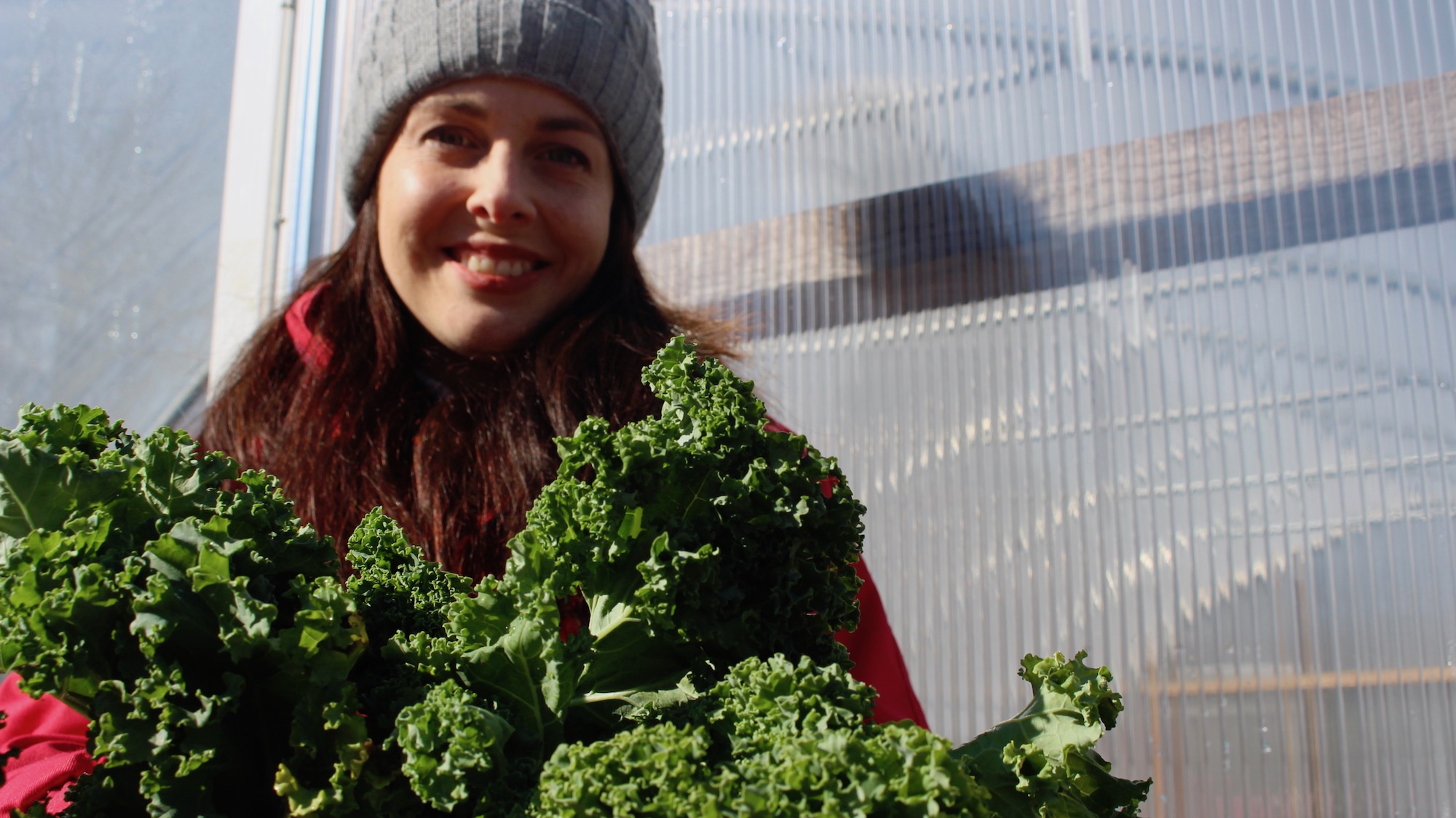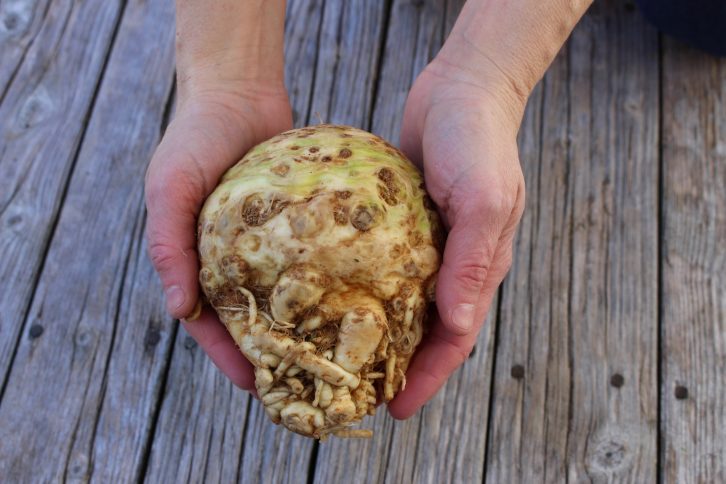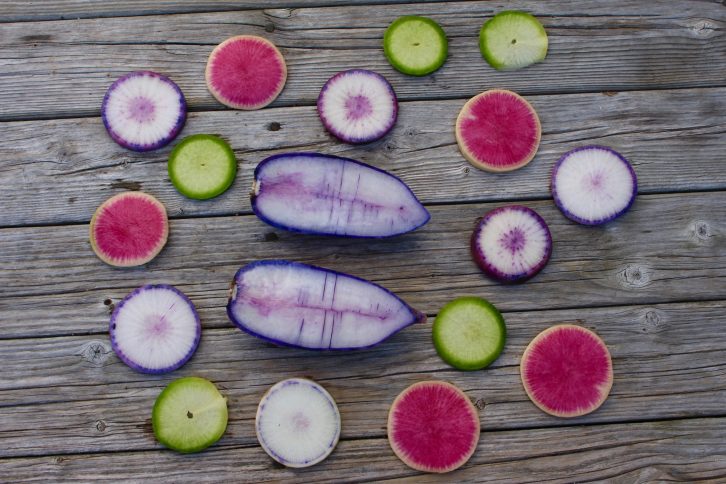Gardening
Harvesting vegetables during the Nova Scotia winter
Author and gardener Niki Jabbour sheds light on how to keep a winter garden.

caption
Niki Jabbour poses with kale outside her polytunnel.When young Niki Jabbour had a Dalhousie University dorm room full of plants, she didn’t expect that a couple of decades later she would be travelling around North America writing books and lecturing on growing vegetables in winter.
Jabbour is an “author and edibles expert” from Halifax and runs the blog Savvy Gardening. She published the award-winning The Year-Round Vegetable Gardener in 2011, which sold over 100,000 copies. Since then, she has published two more books and is working on a fourth.
“You go to the grocery store and you look at those little salad green packages and boxes and most of them come from California; they can all be grown here in Nova Scotia all winter long,” said Jabbour.
In October 2001, Jabbour realized her arugula plant was still looking quite green, in spite of going through some fall frost.
She covered it in an old piece of garden fabric called “row cover” and was able to harvest it until Christmas of that year.
“I was thinking, ‘wow, this plant is pretty hardy,’ and I started thinking about other vegetables I could harvest,” said Jabbour.
She now harvests up to 30 different kinds of vegetables during the winter, including leeks, kale, root vegetables and different types of lettuce. It isn’t just the heartiest of vegetables that will survive, she said, the tender ones are surprisingly strong.
When it comes to vegetables that come in varieties, like lettuce, Jabbour said to do research before planting.
“If there is one called winter density, winter king or winter marvel, I’m pretty sure that’s going to be a good one for winter, so I definitely look at variety and not just the general type of crop,” said Jabbour.

caption
Celery root or celeriac is a common vegetable Jabbour harvests in the winter.Materials
When it comes to shielding crops from the elements, Jabbour uses a variety of methods and materials.
“The easiest thing to do is if you have root crops in your garden this fall like carrots or beets or parsnips, things like that, the best way to extend that harvest all winter long is to cover them with about a foot or so of shredded leaves or straw,” she said.
“I usually put an old bed sheet on top of that just to hold the straw or the leaves in place, and then whenever we want them during the winter, we just push back the cover and reach down and pull out some roots.”
Jabbour then uses a cold frame (short, small four-sided wooden structures) to protect the plants. They often have a removable glass or plastic top to reach the sunlight.
Cold frames and mulch make winter gardening ideal, she said. Cold frames are inexpensive as they can be made using recycled materials and mulch is free.
“You can also use mini-hoop tunnels, which is just a piece of PVC conduit bent over one of your garden beds,” said Jabbour. “You can cover those with plastic so you can have this little mini greenhouse over one of your raised beds, and those last for years and years.”
To grow even more winter crops, Jabbour recently added a polytunnel to her garden. A polytunnel is a walk-in steel greenhouse covered in polythene that conserves heat from the sun. In the polytunnel, her raised beds are converted to mini hoop tunnels.
Less maintenance
While frost may isn’t usually good for exposed or unprotected plants, the cold actually has a positive effect on these vegetables.
“It is like a botanical antifreeze; it protects the plant, helps them last longer in the winter and tastes better, which is amazing,” said Jabbour.
It also discourages animal intervention. Jabbour said slugs and deer are two of the biggest garden problems in the summer. In the winter, the polythene and other shields deter or disable critters from feeding on the crops.
“Because the vegetables are covered by mulch or by a cold frame or a mini hoop tunnel, the deer can’t get to the vegetables, or the rabbits or the groundhogs, and it’s too cold for slugs or other garden pests,” said Jabbour. “So, it’s actually a very quiet time.”
Think ahead
When a storm is coming, Jabbour said gardeners have little to worry about; they just have to make sure cold frames and other structures are strong. After a storm hits, she said to brush off any large amounts of snow so sunlight can reach the crops.
Despite being a low maintenance activity, Jabbour said gardeners have to start thinking about their winter crop in the summer.
“If you think, ‘you know what, I do want carrots for winter,’ then you have to plant a bed of carrots,” she said. “So, it is kind of a second planting season. Other than that, it is so much less work to harvest all winter long.”
Jabbour’s winter crops are planted according to vegetable varieties.
“Some need months of growth, while others are fast growing,” said Jabbour.
She plants crops like carrots, kale, broccoli and beets in mid-summer; salad greens are mostly planted in late fall. This year she harvested her first winter crop between late December and early January.
Her second winter crop is planted four to six weeks before the first expected frost.
She plans to harvest again in March.



D
Donna Logan
S
Sheryl Stewart
K
Kathryn